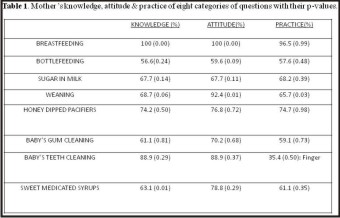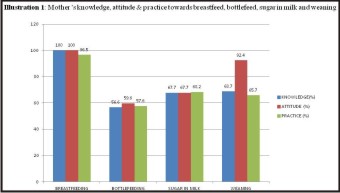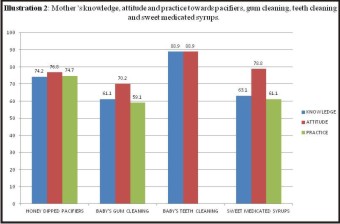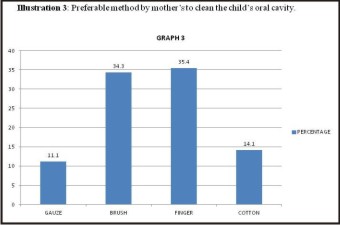Introduction
Oral health is an integral component of pre-school health and well being. Unfortunately, many children are stricken with dental caries at a very early age, even those as young as 12 months.[1] Establishing good oral health in the early years is important for a lifetime of good oral health (Clark et al, 2001).[2] Infant oral health (IOH) is the foundation upon which preventive education and dental care must be built to heighten the opportunity for life time free of preventable oral diseases.[3] Parents are decision-makers in matters of children health and healthcare & therefore, they play an important role in achieving the best oral health outcomes for their young children.[4]
Children less than 5 years of age generally spend most of their time with parents and guardians, especially mothers, even when they are attending pre-schools or nurseries. These early years involve "primary socialization" during which the earliest childhood routines and habits are acquired.[5] These include dietary habits and healthy behaviours established as norms in the home and are dependent on the knowledge and behavior of parents and elder siblings. Studies have accounted that poor attitude of parents toward oral health of infants and young children are associated with increased caries prevalence (Hind and Gregory, 1995).[6]
Effective preventive strategies are integral to improving the oral health quality of life for the very young.[1] Preventive dental care should start early in infancy during the first year of child’s life to ensure successful results. Considering mother’s crucial role in the well being of young children, it is indispensable to explore their knowledge, attitude and practice as it affects the dental care children received at home and their access to professional dental services.[4]
The aim of this study was to evaluate the mother's knowledge, attitude & practice about feeding habits & oral health care in infants and toddlers in Panchkula, India.
Material And Methods
The study comprised mothers of children aged between 0 and 3 years. Informed consent was obtained from all mothers prior to enrolment. Ethical clearance was also taken from the dental college ethical board. Mothers of children aged 0-3 years with mean age of 28.9±2.7, having similar socio-economic status & with no systemic condition/pathology were included in the study.
A multiple choice questionnaire was developed and the questionnaire administered to 200 mothers had 8 questions which focused on the knowledge of mothers about relevant risk and protective factors that are likely to have influence on oral health and feeding practices of their infants & toddlers. The questionnaire explored family demographics, infant and toddler feeding practices & mother’s knowledge & attitude of dental health regarding breastfeed, bottlefeed, sweetened milk, weaning, pacifiers, gums and teeth cleaning & sweet medicated syrups. Some questions were altered after a pilot study was carried out with a convenience sample of mothers to improve understanding and clarity. The interviewed questionnaire asked mothers whether they agreed or disagreed with specific questions designed to glean knowledge and attitude about the feeding habits and oral health care of infants and toddlers. The results were assessed using Descriptive Statistics and Student t-test to compare the association between the groups. p value of 0.05 or less was selected to denote statistical significance.
Results:
The results indicated that mothers of children aged 0-3 years, produced a multifocal picture regarding oral health care and feeding practices of infants and toddlers & mother’s knowledge, attitude and practice score varied widely. (Table 1)
200 (100%) mothers had complete knowledge and attitude about breastfeeding practice with a significant p-value (0.00) whereas 193 (96.5%) mothers practiced it. Knowledge, attitude & practice of mothers regarding bottle-feeding their child were insignificant. Almost 136 (67.7%) mothers knew and thought that sugar should not be added in milk during bottle feeding at night and practiced it. 184 (92.4%) mothers thought that weaning at correct age is important with a significant p value (0.01) out of which 132 (65.7%) mothers weaned off their child after 6 months with p value (0.03). (Illustration 1)
148 (74.2%) mothers knew that honey dipped pacifiers should not be given in child and practiced it. 141 (70.2%) mothers thought that baby’s gum should be cleaned & 119 (59.1%) practiced it. 178 (88.9%) mothers knew & thought that baby’s teeth should be cleaned. 126 (63.1%) mothers knew about the maintenance of teeth & gums after giving sweet medicated syrups to the child with a significant p-value (0.01%) out of which 122 (61.1%) mothers practiced it. (Illustration 2)
The preferred method for cleaning baby’s teeth was finger by 71 (35.4%) mothers followed by brush 69 (34.3%), then by cotton 28 (14.1%) and lastly by gauze 22 (11.1%). (Illustration 3)
 | Table 1
 |
 | Illustration 1
 |
 | Illustration 2
 |
 | Illustration 3
 |
Discussion
The response to feeding practices section of questionnaire was encouraging as mothers had good knowledge about feeding practices which include questions regarding breastfeed, bottle feed during night, weaning, sugar and honey dipped pacifiers. Despite having good knowledge, many mothers reported of using nursing bottle during bed time. Similar results were accounted by Gussy et al, in rural Australian mothers, which is contrary to the MCHN recommendation,[7] although it is apparent that the content of the bottle is more important than the use of the bottle. 68.7 % mothers knew that weaning should occur at 6 months which was in accordance with the study conducted by P. Elizana et al, 2010.[8] 34.3% mothers introduced semi-solid food at 1 year of age in their children which was similar to the results obtained by Mani et al[2] where semisolid food was started at one year of age in 38% of the children.
Mothers had good knowledge regarding the use of honey dipped pacifiers. 74.2% mothers knew that honey dipped pacifiers should not be given to the child which was in accordance with the study conducted by Mani et al[2] who stated that 70% of parents agree that pacifiers use can affect the normal development of children’s teeth. Vinay et al,[6],[9] reported that despite the good level of general knowledge of the causes of dental caries, many parents gave their children nipples covered with sugar or honey and sweet drinks before their bedtime.
Cleaning a child’s mouth should begin before teeth erupt & tooth brushing is recommended when the first tooth erupts at least once daily till 2 years & subsequently twice daily (Berg & Slayton, 2009)[2]. In the present study, the knowledge regarding the oral hygiene practice which includes brushing the teeth was not satisfactory. 88.9% mothers felt that they should brush their child's teeth when all the primary teeth have erupted. Fewer mothers knew that children’s mouth should be cleaned before teeth erupts which was in accordance with the study conducted by Mani et al.[2] The majority of the mothers did not brush the teeth of their children who were under 2 years old because of lack of awareness. This is uniform with the findings from previous studies [Habibian et al., 2001; Suresh et al., 2010][5] who found that most of the parents started brushing their children's teeth when all the primary teeth had erupted. Contrary to our result, 95% of the parents in rural Australia believed that they should start brushing when the first tooth-erupts, as reported by Gussy et al[7] in their study. Skaret et al.[9],[10] noted that habits established at the age of 3 years tend to persist during the next years. Hence it is extremely important to teach a child proper health habits as early as possible.
Parental knowledge about infant oral health was found to be lacking in many studies (Blinkhorn et al, 2001; Gussy et al, 2008; Hoeft et al, 2010; Orenuga & Sofola, 2005; Singh & King, 2003).[2] Most of the mothers had good knowledge about diet, but knowledge of oral hygiene was very poor. This suggests a need for paediatricians and the primary health workers, who come in contact with young mothers, to play a dynamic role in oral health promotion and to draw mother's attention to the need for their child to be seen by a dentist.[5] Conditions established in pre-school years provide a foundation for oral health condition and patterns for use of dental services later and in adulthood. Parents, particularly mothers, need to be helped to realize that they are role models for their children and to be encouraged to improve the child's dental health habit.
The limitation of this study was the smaller number of subjects. Further studies with larger samples can help clarify and motivate necessary policy changes. In addition, as stated by Hawley and Holloway (1994), this approach to access knowledge, attitude & practice can be notoriously inaccurate, for when approached face to face by a professional person; subjects will attempt to say what they knew, rather than what is in fact practiced. While this research gives a glimpse into the attitude of mothers from Panchkula city, there is an extreme need for complementary qualitative research exploring the themes underlying infant and toddlers oral health and feeding practices.[1]
Conclusion
To our knowledge, there are very few Indian studies involving mothers and children of this age group. This study provides important new data to the evidence base related to knowledge, attitude & practice of mothers toward oral hygiene and feeding practices of infants and toddlers. If oral health promotion efforts are to be made effective in improving the oral health of young children, it is essential for the paediatric dentists that there should be a good understanding of parental and caregiver knowledge and attitude. Such findings may help to guide and modify current and future oral health prevention activities. Oral hygiene habits and dietary habits are established during pre-school days and the parents, particularly mothers, function as role models for their children and outcome is strongly influenced by their knowledge and beliefs.
References
1. Robert JS, Douglas JB, Michael EKM. Caregiver knowledge and attitudes of preschool oral health and early childhood caries. International journal of circumpolar health;66:1,2007
2. Mani SA, John J, Ping WY, Ismail NM. Early childhood caries: parent’s knowledge, attitude & practice towards its prevention in Malaysia. Oral Health care-paediatric, research, epidemiology & clinical practices.
3. American Academy of Pediatric Dentistry. Clinical guidelines on infant oral health care. Pediatr Dent 2004; 26: 67-70.
4. Shivaprakash PK, Elango I, Baweja DK, Noorani NH. The state of infant oral healthcare knowledge and awareness: Disparity among parents and health care professionals. JISPPD 2009; 27(1): 39-43.
5. Suresh BS, Ravishankar TL, Chaitra TR, Mohapatra AK, Gupta V. Mother’s knowledge about pre-school child’s oral health. JISPPD 2010; 28(4): 282-87.
6. Vinay S, Naveen N, Naganandini N. Feeding and oral hygiene habits of children attending daycare centres in Bangalore and their caretakers oral health knowledge, attitude and practices. Indian J Dent Res.2011; 22(4): 561-6.
7. Gussy MG, Waters EB, Riggs EM, Lo SK, Kilpatrick NM. Parental knowledge, beliefs and behaviours for oral health of toddlers residing in rural Victoria. Aust Dent J 2008; 53: 52-60
8. P Elizana, Ylli A, Roshi E, Mersini E, Bukli M, Manners K. Knowledge, attitude AND practice survey on anaemia and infant feeding practices of primary health care providers (PHCP). Albania; 2010. 58 p.
9. Baginska J, Rodakowska E. Knowledge and practice of caries prevention in mothers from Bialystok, Poland.IJCRIMPH 2012; 4: 4
10. Reisine S, Douglass JM. Psychosocial and behavioral issues in early childhood caries. Community Dent Oral Epidemiol 1998; 261: 32-44.
|